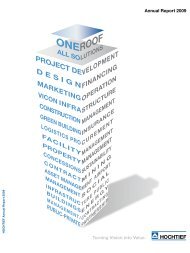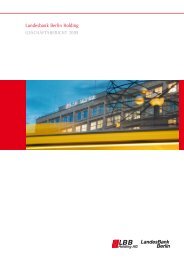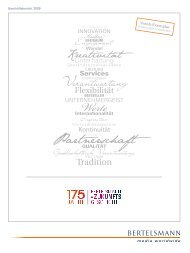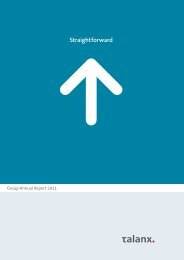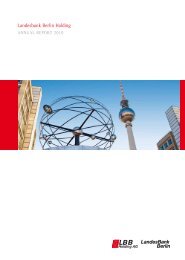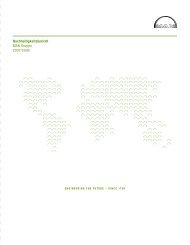Values
Values
Values
Create successful ePaper yourself
Turn your PDF publications into a flip-book with our unique Google optimized e-Paper software.
D<br />
üsseldorf, February 11, 2003, 4:00 a.m.<br />
The ink on the Ullstein Heyne List acquisition<br />
contract between the Axel<br />
Springer publishing group and Random<br />
House is still drying. In 14 of the 15<br />
white Vitra chairs surrounding the long<br />
table of a Düsseldorf law fi rm sit utterly<br />
exhausted men. They’ve got four long<br />
days of hard work behind them.<br />
The empty chair was occupied by<br />
Joerg Pfuhl. The lead negotiator for<br />
Random House left the room without<br />
saying a word once the contract was<br />
signed. While the tension of the last few<br />
days slowly seeps out of the 14 others,<br />
the man who paved the way for 400 authors<br />
– including bestsellers like John<br />
Grisham, Nicholas Sparks, Stephen<br />
King, Mary Higgins-Clark, and Robert<br />
Harris – to move under Random<br />
House’s roof is at a snack bar, waiting<br />
on 15 orders of the Westphalian-style<br />
fries known as pommes schranke.<br />
The staff at the law fi rm are used to<br />
conclusions of this kind; that’s why a<br />
fridge stocked with champagne features<br />
prominently in the meeting<br />
room. While Pfuhl surprises the group<br />
with fast food, the lawyers start letting<br />
the corks fl y. The fi rst chapter in the secret<br />
negotiating marathon to buy<br />
Heyne comes to a close with a feast of<br />
bubbly, sausage, and fries.<br />
After signing the contract in Düsseldorf,<br />
Pfuhl fl ies to Munich where he<br />
calls a staff meeting at 9:30 a.m. The<br />
foyer is full. For many employees, it’s<br />
the fi rst time they’ve seen their boss,<br />
who took on the job only a few weeks<br />
earlier. “Random House is taking over<br />
Ullstein Heyne List, pending the approval<br />
of the cartel offi ce,” Pfuhl announces.<br />
There’s silence, astonishment.<br />
And then a roar of applause.<br />
At 10:30 a.m., Springer board member<br />
Hubertus Meyer-Burckhardt explains<br />
the sale to Random House in a<br />
press release as follows: “Despite the reorganization<br />
measures that have been<br />
introduced, we don’t see suffi ciently attractive<br />
prospects for fi nancial returns<br />
in the group’s current structure.”<br />
At this time, Germany’s bookselling<br />
market is in crisis. The number of books<br />
– 24 –<br />
MERGER IN MIDST OF CRISIS<br />
being sold by traditional booksellers<br />
has decreased signifi cantly, and there’s<br />
an atmosphere of uncertainty due to<br />
electronic media and new consumer<br />
reading habits. The German book market<br />
registered sharp declines in revenues<br />
from 9.41 billion euros in 2001 to<br />
9.07 billion euros in 2003. Despite this,<br />
Random House continues to believe in<br />
the book as an important cultural asset<br />
and investment opportunity.<br />
But the takeover proves to be a diffi -<br />
cult undertaking. Fearing a “position of<br />
Betting<br />
on the book<br />
business<br />
market dominance” on the paperback<br />
market, the German cartel offi ce indicates<br />
a ruling against the acquisition of<br />
the entire group in May 2003. Yet the<br />
authorities agree to a solution proposed<br />
by Random House: the acquisition<br />
will be limited to Heyne’s core<br />
business with the imprints Südwest,<br />
Ludwig, Ansata, and Integral. The other<br />
publishing houses belonging to the<br />
group – Econ, Ullstein, List, and<br />
Claassen – are to be sold to the Swedish<br />
publishing group Bonnier, together<br />
with the paperback lines from Heyne<br />
Esoterik and Heyne Fantasy.<br />
On November 25, 2003, Pfuhl welcomes<br />
all the new employees joining<br />
the Random House Group, and promises<br />
to provide a corporate culture of<br />
stability. But skepticism still reigns.<br />
And it is only over the course of the<br />
months that follow that the mood<br />
transforms into confi dence, not least<br />
because the integration takes place<br />
In the midst of the German<br />
bookselling crisis, Bertelsmann<br />
decided to go ahead with a large<br />
publishing acquisition deal. After<br />
marathon negotiations and months<br />
of talks with competition authorities,<br />
Random House Germany became<br />
the owners of the Heyne publishing<br />
group. The purchase of the<br />
paperback pioneer was risky, but it<br />
quickly became profitable.<br />
quickly, and opens up many new opportunities.<br />
Within a month, fi nancial<br />
systems have been synchronized and<br />
integrated. A month later, the new corporate<br />
organization is in place, and<br />
sales and marketing soon follow. Employees<br />
are informed about the integration<br />
team’s every major move via the<br />
intranet “@random.”<br />
In the Random House Group with<br />
its 43 publishing companies, almost all



